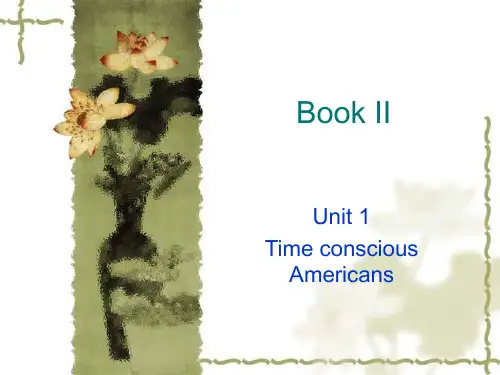unittimeconsciousAmericans美国人的时间观念课件
- 格式:pdf
- 大小:11.19 MB
- 文档页数:93
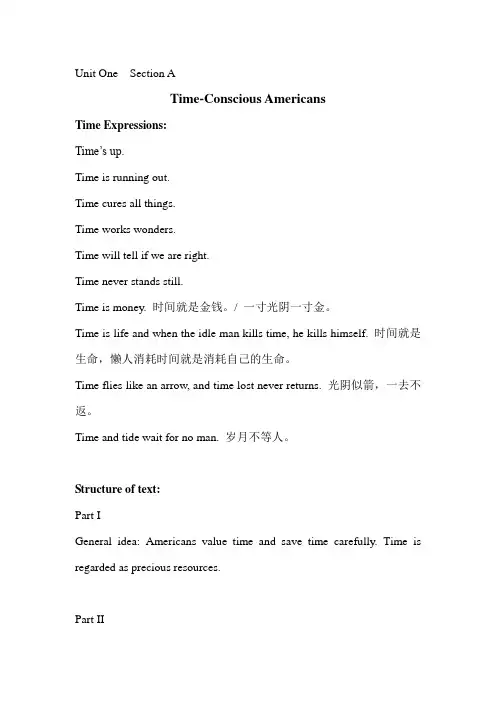
Unit One Section ATime-Conscious AmericansTime Expressions:Time’s up.Time is running out.Time cures all things.Time works wonders.Time will tell if we are right.Time never stands still.Time is money. 时间就是金钱。
/ 一寸光阴一寸金。
Time is life and when the idle man kills time, he kills himself. 时间就是生命,懒人消耗时间就是消耗自己的生命。
Time flies like an arrow, and time lost never returns. 光阴似箭,一去不返。
Time and tide wait for no man. 岁月不等人。
Structure of text:Part IGeneral idea: Americans value time and save time carefully. Time is regarded as precious resources.Part IIIllustration of general point: Americans try every means to save time. They save time in their daily life, business and work as well. They also create a series of devices to improve efficiency.Part IIIRestatement and emphasis of the general idea: While new arrivals to the U.S. regard time differently, Americans do take it as a sign of skillfulness or being competent to solve a problem or fulfill a job with speed.Language focus:1. Americans believe no one stands still. If you are not moving ahead, you are falling behind. (L1)stand – keep or stay in a particular position or stateeg. The room stands idle. 这房间闲置着。
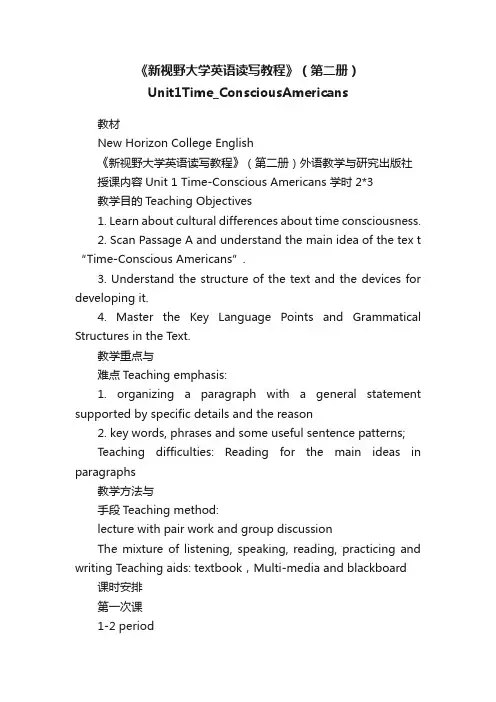
《新视野大学英语读写教程》(第二册)Unit1Time_ConsciousAmericans教材New Horizon College English《新视野大学英语读写教程》(第二册)外语教学与研究出版社授课内容Unit 1 Time-Conscious Americans 学时2*3教学目的Teaching Objectives1. Learn about cultural differences about time consciousness.2. Scan Passage A and understand the main idea of the tex t “Time-Conscious Americans”.3. Understand the structure of the text and the devices for developing it.4. Master the Key Language Points and Grammatical Structures in the T ext.教学重点与难点Teaching emphasis:1. organizing a paragraph with a general statement supported by specific details and the reason2. key words, phrases and some useful sentence patterns;Teaching difficulties: Reading for the main ideas in paragraphs教学方法与手段Teaching method:lecture with pair work and group discussionThe mixture of listening, speaking, reading, practicing and writing Teaching aids: textbook,Multi-media and blackboard 课时安排第一次课1-2 periodⅠWarm-up Activity1.Group work 15m2.Questions for thought and discussion 15mⅡBackground Information 10mⅢ listening 25mⅣ watch and Answer 25m第二次课3-4 periodⅤText Analysis·Global Reading 25m1. Main idea2. Text structure·Detailed Reading 65mWordsPhrasesLanguage points第三次课5-6 periodLanguage points 15mⅥText Summary 5mⅦWriting 25mⅧExercise Explanation 45m教学要点Teaching Points:1. Let the Ss know the learning objectives of this unit;2. Help the Ss understand the text as a whole and know some background knowledge;3. Have the Ss know some ideas of fame;4. Guide the Ss use freely the active expressions, key grammatical points and sentence patterns in this text.作业布置与思考Assignments:1. Vocabulary: Students are asked to master the key words and phrases.2. Sentence Structure: Teacher summaries the usage of “either…or” and “where” and Studentspractice rewriting sentences after the models.3. Translation教学参考书和网络资源Reference Books and Resources:1. Teacher’s Book of New Horizon College English2. Longman Dictionary of Contemporary English (English-Chinese)3. Oxford Advanced Learner’s English-Chinese Dictionary4. Longman Dictionary of American English5. On-line resources: English on line教学过程1-2 PeriodⅠWarm-up Activity (提问板书)1. Group work:1) Find out idioms Chinese have about time.Time is money.(时间就是金钱或一寸光阴一寸金)Time and tide wait for no man.(岁月不待人)Never put off till tomorrow what may be done today.(今日事,今日毕)2) Find out major differences of time between Chinese and English culture.Chinese Culture:a)masses (collectivism).b)human and 'heaven' as one (天人和一).c)ethics and tolerance (中恕之道).d)internal cultivation (修身养性).Western culture:a)Individualism.b)adventurous and exploration based.c)based on scienced)law to resolve people and people's relationship.e)'god' and religion to resolve human and spiritualism relationship.2. Questions for thought and discussion:(提问课本)1)What precious resources do Americans value and save?2)What are the three kinds of behavior that Americans consider to be a waste of time?3)In what different ways do Americans approach time in business relations?Ⅱ Background Information: (讲解课件)1. Cultural Conflicts:Each nation has its own conventions. Different nations have different cultures. When two cultures clash, problems in communication may occur. Which side should compromise when there are cultural conflicts? In fact, knowing and understanding the other's culture is the responsibility of both sides, and both sides should be willing to compromise. Educating, rather than complaining and blaming, is the best solution to cultural conflicts.2. Hourglass:A glass container holding fine sand for measuring time, which is narrow in themiddle like a figure 8 so that the sand inside can run slowly from the top half to the bottom taking exactly one hour.。


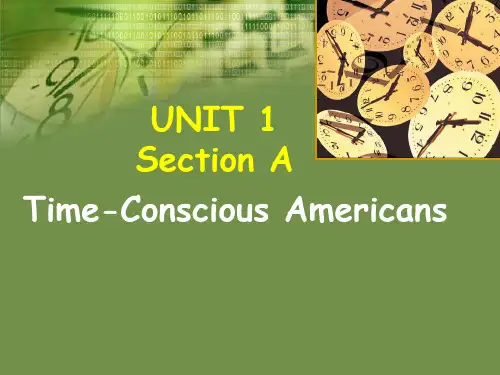

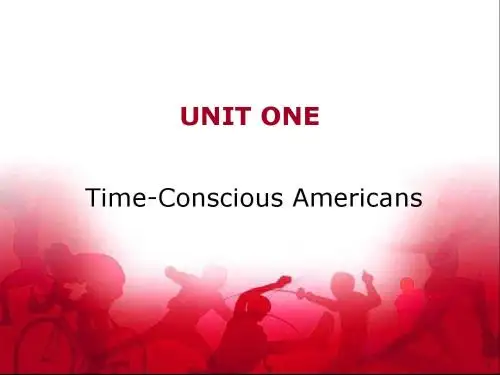
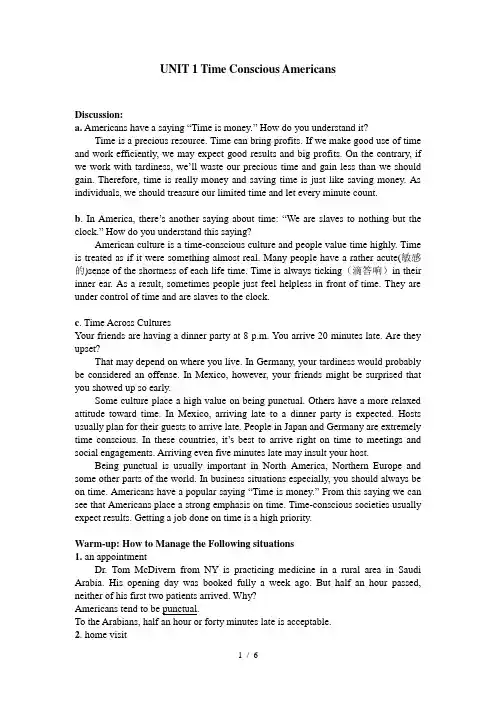
UNIT 1 Time Conscious AmericansDiscussion:a. Americans have a saying “Time is money.” How do you understand it?Time is a precious resource. Time can bring profits. If we make good use of time and work efficiently, we may expect good results and big profits. On the contrary, if we work with tardiness, we’ll waste our precious time and gain less than we should gain. Therefore, time is really money and saving time is just like saving money. As individuals, we should treasure our limited time and let every minute count.b. In America, there’s another saying about time: “We are slaves to nothing but the clock.” How do you understand this saying?American culture is a time-conscious culture and people value time highly. Time is treated as if it were something almost real. Many people have a rather acute(敏感的)sense of the shortness of each life time. Time is always ticking(滴答响)in their inner ear. As a result, sometimes people just feel helpless in front of time. They are under control of time and are slaves to the clock.c. Time Across CulturesYour friends are having a dinner party at 8 p.m. You arrive 20 minutes late. Are they upset?That may depend on where you live. In Germany, your tardiness would probably be considered an offense. In Mexico, however, your friends might be surprised that you showed up so early.Some culture place a high value on being punctual. Others have a more relaxed attitude toward time. In Mexico, arriving late to a dinner party is expected. Hosts usually plan for their guests to arrive late. People in Japan and Germany are extremely time conscious. In these countries, it’s best to arrive right on time to meetings and social engagements. Arriving even five minutes late may insult your host.Being punctual is usually important in North America, Northern Europe and some other parts of the world. In business situations especially, you should always be on time. Americans have a popular saying “Time is money.” From this saying we can see that Americans place a strong emphasis on time. Time-conscious societies usually expect results. Getting a job done on time is a high priority.Warm-up: How to Manage the Following situations1. an appointmentDr. Tom McDivern from NY is practicing medicine in a rural area in Saudi Arabia. His opening day was booked fully a week ago. But half an hour passed, neither of his first two patients arrived. Why?Americans tend to be punctual.To the Arabians, half an hour or forty minutes late is acceptable.2. home visitOn your way home, it occurred to you that your American friend Mary had invited you to visit her when you were free. Then you dropped in on her house. But when you knocked at the door …Mary felt surprised. Why?In China, it’s OK to visit friends without calling ahead of time. While in the U.S. it’s impolite to do so.3. to a partyYour American friend invited you to her party tonight at 7:30. When are you supposed to get there? Why?A. Before 7:00, to help her to prepare.B. 5’-10’ late, not to be the first guest. (u.s)C. After 8:00, I’m the VIP.D. 5’-10’ earlier,it’s a polite way to show my respect for her.In China, close friends tend to arrive A,but acquaintances tend to arrive D4. being invited to dinnerYour American friend invited you to her house for dinner at :30. When are you supposed to get there?A. Right on time. (u.s)B. Be fashionably late.C. Half an hour late.D. About 5’-10’ earlier.(China)5. an interviewDuring an interview, the American boss asks about your idea on salary as a secretary, which answer will be good for you?a. Any sum of money is OK for me.b. At least $2500, I’m the best.c. $1,000 a month. I can make it.e. Oh, money is not important to me. I don’t come here simply for money.In America, a person’s success is based on how much money he makes. And Americans are not afraid of showing their confidence. To most Chinese, it’d be the responsibility of the company to decide the salary according to the employee’s performance.THIS MAY BE DUE TO CULTURAL DIFFERENCESBackground Information:American culture1. Individualism (个人主义)Most Americans see themselves first as individuals and then as a member of a community, family or other groups. Some people from other countries view this as being “selfish”. Others view it as freedom from constraints (约束).2. Equality (平等) and Informality (不拘礼节)Most Americans treat each other in informal ways, even in the presence of great differences in age or social standing. Some see this as a “lack of respect”. Others see it as a healthy lack of concern for social ritual (礼仪).3.Time ConsciousnessMost Americans place a strong emphasis on being on time. They tend to organize time by means of schedules.4. Keeping Appointments and DatesIt is considered impolite and extremely inconsiderate (考虑不周的) to fail to keep an appointment or date without giving prior notice to the other person. If you do not plan to meet the person, then you should decline the invitation.5. FriendshipsFriendships are often less intense and shorter than those among people from many cultures. Americans often seem very friendly at first, even when you first meet them. This friendliness does not usually mean that the American is looking for a deeper relationship.Text analysis:What does the writer want to tell us? Americans are time conscious.How does he support his idea? By giving specific details, then telling the reasons. Para.1What are the two things Americans try to save? Time and labor.Para.2-7The ways Americans save time include:1. They treat time seriously.2. They do everything in a hurry.3. They start talking business quickly.4. They use modern devices to communicate with each other efficiently.Para.8Conclusion: different ideasTo successfully solve a problem and to fulfill a job with speed is taken by Americans as a sign of skillfulness or being competent.Paraphrase1. Americans believe no one stands still. If you are not moving ahead, you are falling behind.In Americans’ opinion, no one keeps motionless. Everyone moves and advances. If you are not moving ahead, you will become further behind.i.e: In the race of human life, you will never win any place if you are always satisfied with what you are and stand still.在人生的竞赛中,如果你总是安于现状、停滞不前,你永远也不会成为胜者。

